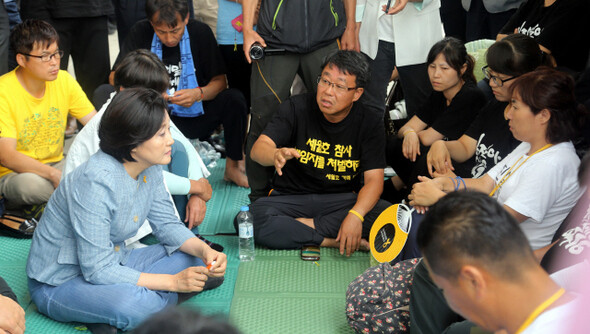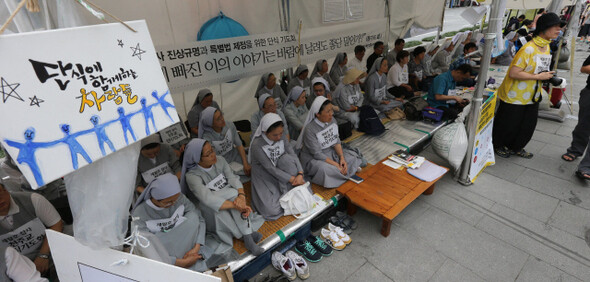hankyoreh
Links to other country sites 다른 나라 사이트 링크
[Editorial] The opposition must renegotiate the special Sewol Law

The New Politics Alliance for Democracy (NPAD) has been in a mood of mourning since last week’s bipartisan agreement on the special Sewol Law. Already reeling from the battering it suffered in the July 30 by-elections, the party seemed to be on deathwatch amid a heavy torrent of criticism from Sewol victim’s family members and civic groups. The festive atmosphere in the ruling Saenuri Party (NFP) could not have been more different. It was plain to see which side came out the winner from the talks on the law, and which side lost.
The NPAD obviously has an explanation for its decision. It could hardly have been easy to yield in the face of the Saenuri Party’s grasping, while taking over the talks would have been a political liability. Floor leader Park Young-sun tried her best to make the deal out as a win for the NPAD, noting that the opposition got the right to have five of its nominees and three people nominated by the family members on the investigation committee. “The investigation committee was always the key thing with the special Sewol Law,” she argued on Aug. 10. There is some degree of logic to this. The problem is that it doesn’t strike anyone as nearly worth the political cost of the opposition holding up the white flag on the investigative authority issue.
The special law was supposed to be about an investigation where nothing was sacred. So it made complete sense to give the investigation committee authority to investigate and indict. If that was truly off the table, then it should have at least come away with just the investigative powers, or given the opposition the right to nominate a special prosecutor. That would have been a political concession - a compromise. Instead, we have the opposition limply giving away the key investigative authority issue, only to turn around and act like its ability to put people on the investigative committee is an accomplishment. And even if the committee does get the right to select witnesses or demand documents, past examples show just how little it can do when the people in question don’t comply.
The opposition is in a dilemma right now. Ditching the current agreement and demanding new negotiations would be an embarrassment, but neither can it really work with the deal that was reached. What the opposition should be keeping in mind here is the importance the investigation into the Sewol tragedy holds, its meaning for South Korea’s future. Also, it should realize that expecting a thorough investigation after this agreement would be like fishing up a tree. If you think something is a mistake, the brave thing to do is admit it and try to fix it.
One possibility would be the NPAD to demand renegotiations as part of its platform at its Aug. 11 general lawmakers’ meeting, and for Park Young-sun to go along with it. It’s an approach that jibes with the party’s democratic operating principles. Voters may not like the way the opposition always seems to be in some kind of battle, but hopefully the party will realize that they respect it even less when it simply gives way.

Please direct questions or comments to [english@hani.co.kr]

Editorial・opinion
![[Column] Park Geun-hye déjà vu in Yoon Suk-yeol [Column] Park Geun-hye déjà vu in Yoon Suk-yeol](https://flexible.img.hani.co.kr/flexible/normal/500/300/imgdb/original/2024/0424/651713945113788.jpg) [Column] Park Geun-hye déjà vu in Yoon Suk-yeol
[Column] Park Geun-hye déjà vu in Yoon Suk-yeol![[Editorial] New weight of N. Korea’s nuclear threats makes dialogue all the more urgent [Editorial] New weight of N. Korea’s nuclear threats makes dialogue all the more urgent](https://flexible.img.hani.co.kr/flexible/normal/500/300/imgdb/original/2024/0424/7317139454662664.jpg) [Editorial] New weight of N. Korea’s nuclear threats makes dialogue all the more urgent
[Editorial] New weight of N. Korea’s nuclear threats makes dialogue all the more urgent- [Guest essay] The real reason Korea’s new right wants to dub Rhee a founding father
- [Column] ‘Choson’: Is it time we start referring to N. Korea in its own terms?
- [Editorial] Japan’s rewriting of history with Korea has gone too far
- [Column] The president’s questionable capacity for dialogue
- [Column] Are chaebol firms just pizza pies for families to divvy up as they please?
- [Column] Has Korea, too, crossed the Rubicon on China?
- [Correspondent’s column] In Japan’s alliance with US, echoes of its past alliances with UK
- [Editorial] Does Yoon think the Korean public is wrong?
Most viewed articles
- 1‘We must say no’: Seoul defense chief on Korean, USFK involvement in hypothetical Taiwan crisis
- 2Will NewJeans end up collateral damage in internal feud at K-pop juggernaut Hybe?
- 3[Column] Park Geun-hye déjà vu in Yoon Suk-yeol
- 4Why Korea shouldn’t welcome Japan’s newly beefed up defense cooperation with US
- 5Thursday to mark start of resignations by senior doctors amid standoff with government
- 6N. Korean hackers breached 10 defense contractors in South for months, police say
- 7[Guest essay] The real reason Korea’s new right wants to dub Rhee a founding father
- 8[Column] ‘Choson’: Is it time we start referring to N. Korea in its own terms?
- 9Kim Jong-un expressed ‘satisfaction’ with nuclear counterstrike drill directed at South
- 10[Editorial] New weight of N. Korea’s nuclear threats makes dialogue all the more urgent